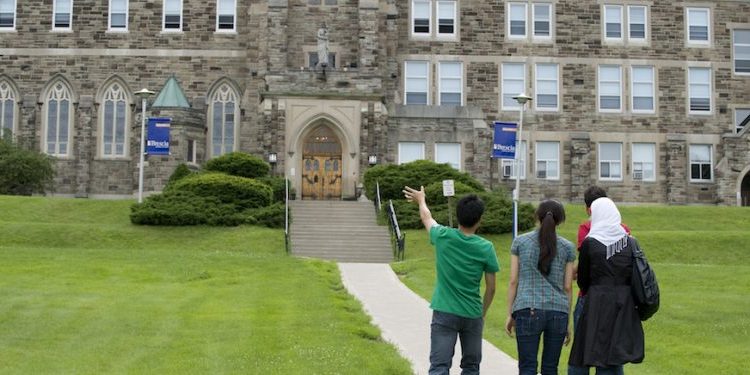América del Norte/Canadá/26 de Agosto de 2016/Autor: Backie Smith/Fuente: The Pie News
RESUMEN: El cambio en la regulación coloca instituciones canadienses a la par con sus homólogos estadounidenses cuando se trata de la expedición de visados. La decisión del IRCC siguió pisando los talones de orientación emitida el mes pasado por SEVP en los EE.UU., que han precisado que las universidades no están autorizados a emitir certificados de elegibilidad para visas a estudiantes dados admisión condicional.La emisión de un permiso de estudios a largo plazo para los programas independientes está teniendo un impacto en los informes de cumplimiento. Los educadores en Canadá han expresado su preocupación por el impacto de un cambio en la emisión de permisos y las admisiones condicionales para estudiar. Sólo cuando los estudiantes pueden demostrar que han completado los requisitos previos para estudios posteriores van a ser capaces de aplicar un su segundo permiso de estudios.
Educators in Canada have voiced their concern over the impact of a change to study permit issuance and conditional admissions that will mean international students completing a pathway or language programme before progressing to postsecondary study must obtain a separate study permit for each course.
Until now, students offered acceptance to a college or university on condition of completing another course have been issued a study permit for the duration of both courses. But last month, Immigration, Refugees and Citizenship Canada said that effective immediately, it will no longer issue study permits on the basis of conditional admission.
In the case of conditional admission based on the completion of a prerequisite progamme, immigration officers will only issue a study permit for the duration of students’ first programme of study.
Only when students can demonstrate they have completed the prerequisites for further study will they be able to apply for their second study permit.
An update published on IRCC’s website said the change stemmed from concerns that students may be abusing the immigration system. Because a study permit affords postsecondary international students work rights, there is a danger that students who do not successfully complete their prerequisite programme will nevertheless stay in Canada to work, it said.
“The issuance of a long-term study permit for two separate programs is having an impact on compliance reporting,” the notice stated.
“Issuing a study permit or SX-1 visa for the first prerequisite program only will ensure compliance reporting is sent to the appropriate [institution], and students will not be negatively affected,” it adds.
Despite these assurances, educators have qualms over the potential impact of the change, which was quietly introduced through an internal decision over IRCC over visa processing.
“The biggest concern we have, of course, is around delays,” Gonzalo Peralta, executive director of representative body Languages Canada, told The PIE News. He noted that a student taking a language course in summer would have only weeks to obtain a permit that would allow them to attend college in September.
Some 10,600 international students entering Canadian universities come via pathway programmes each year, according to a study published last year, and Peralta estimated that the number of students affected by the new regulations will be far greater, as many more complete prerequisite language programmes before progressing to further study.
“Are [IRCC] going to be able to handle processing and other 25-40,000 permit renewals per year?” he asked.
The association’s members have also said they are worried about the costs the new system might incur for students and schools.
“There’s a cost attached to that which is passed onto the student for – we don’t believe – any valid reason, because it’s not going to actually provide any more integrity as far as we’re concerned,” he said.
“The second point is it creates more administrative drain on resources for institutions. Every educational institution is concerned with where their dollar is going.”
The impact of the changes may not be as dramatic as some schools fear, Peralta said, but the lack of industry consultation on the issue means it’s an unknown.
“It might actually even be a good thing, but that’s not the way it reads and we have no way of knowing,” he said. “And not only was there no consultation, there is no process to implement it in a way that’s not going to disturb the lives of thousands.”
Languages Canada is in the process of canvassing its members to gain a clearer picture of how they may be affected.
Like Languages Canada, Tina Bax, founder and president of ELT and pathway provider CultureWorks is sympathetic to IRCC’s aims. “But adding an additional regulatory hoop for students who want to go on as planned seems silly,” she added. “We used to have that regulation 15 years ago in Canada. It seems as though we’re going backwards.”
Bax suggested that alternative options could help IRCC to keep track of students, without requiring students to change visas.
“Why not require schools to report students who don’t show up, or who leave the programme, to IRCC? IRCC could then track whether the student re-enrolled somewhere else,” she said.
The regulatory change places Canadian institutions on a par with their American counterparts when it comes to visa issuance. IRCC’s decision followed hot on the heels of guidance issued last month by SEVP in the US, which clarified that universities are not allowed to issue certificates of eligibility for visas to students given conditional admission.
Fuente: http://thepienews.com/news/canada-concern-over-study-permits-rule-change/







 Users Today : 42
Users Today : 42 Total Users : 35459508
Total Users : 35459508 Views Today : 57
Views Today : 57 Total views : 3417815
Total views : 3417815